
Four Alternatives to Companies House to Find UK Business Data
Simone Autiero, 05 October 2023
Companies House is the UK’s public register of businesses. You can use its data to find key information on all companies, including their incorporation dates, annual filings, directors, and much more. But if you’ve used Companies House to look for this information already, you’ve probably encountered its limitations:
- Companies House data is on legal entities, not companies as they’re commonly known. For instance, you might not find familiar names like Boots or Deliveroo listed on Companies House—as their legal entity name may be different.
- It’s really difficult to search for companies by industry. Companies House uses Standard Industrial Categorisation (SIC) codes to organise businesses. These haven’t been updated since 2003, meaning you won’t find any industries newer than that. For example, modern industries like fintech, AI, and blockchain are still listed under broad categories such as ‘Other information technology service activities (62090)’. That doesn’t help you find specific types of companies in high-growth industries.
- There are limits to the data it includes. For instance, you won’t find information on key events in a company, such as when it was founded or if it received investment. There are companies in the UK that aren’t listed on Companies House, too.
- Companies House data can be out of date or inaccurate. Companies have nine months to submit their annual accounts, and the accuracy of the information they supply is their responsibility. Companies House explicitly says it “does not verify accuracy of information filed”. Put simply: the data isn’t always trustworthy.
- It’s a hassle to extract and compare data about companies. Most filings are uploaded as scanned PDFs, where the text is not searchable. That means you have to manually find information you want. Plus, they’re not standardised, meaning the data you have on one company might not be available for another.
- It lacks information on key people. While Companies House features data on directors and business owners, it doesn’t show full contact information or provide insights into their network. It’s tricky to use Companies House search this way, and you’ll also have to sift through multiple entries for the same name.
Just one example of how these issues might limit you:
If you’re looking for a company of a specific size in a specific sector and region—say, a fintech scaleup in Manchester—it would be really hard to find it through Companies House. Searching by SIC codes would return several irrelevant companies, whose filings you’d have to trawl through manually to find recent investments.
For most universities, councils, or private companies, accessing this data via Companies House—and controlling its accuracy—is a huge drain on time and resources.
But there are alternative platforms to search for UK company information. In this article, we introduce four alternatives to Companies House, starting with our own platforms.
Four alternatives to Companies House
1. Beauhurst: Get accurate data on every single UK company
To solve the problem of finding rich, accurate, and up-to-date UK company information, we built Beauhurst platforms specifically for the public sector, professional services, investors, and company sales teams.
We have data on every single company in the UK. As of 2023, that adds up to nearly 13 million companies, compared to 5 million on Companies House. The amount of data that Beauhurst has on each company—and the quality of that data—is genuinely unmatched.
For every company, users can browse thousands of data points—on significant company events, key people, company value, and more. For instance, you can see:
- Which patents they’ve filed in which countries
- If they have spunout of a university
- Their latest funding rounds
- And lots, lots more
We use a vast range of up-to-date sources, including HMRC, censuses, European patents, direct private company updates, industry and national media, and others. This also includes Companies House data, which we enrich and update so you get the complete picture.
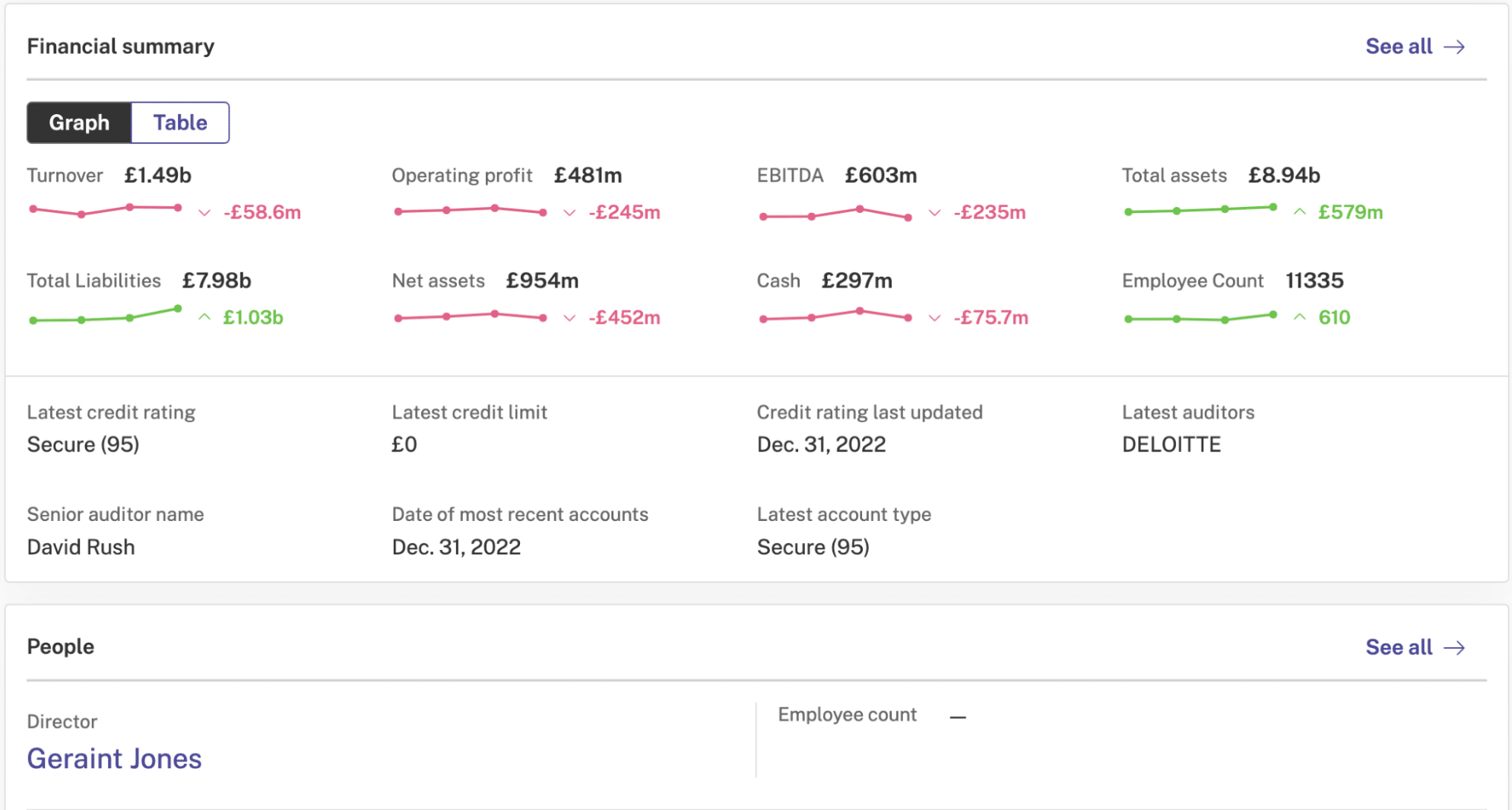
Our team of more than 60 analysts and developers stitch this data together to create rich profiles on each company, holdings, ownership structure, and operating names—plus the key people that work in them. These experts, alongside machine learning technology, make sure the data is clean, accurate, standardised, and completely up-to-date.
(Companies House filings are only updated once per year—and they only reflect what the listed companies update themselves.)
Beauhurst platforms are used by organisations of all shapes and sizes to:
- Get in-depth data on every company in the UK, no matter how new
- Search for companies in a local area, in a specific industry, or of a particular size
- Find businesses to partner with for research, funding, or development
- Discover companies pioneering specific technologies in specific fields
- Understand which companies are growing and which are established in an area
- See trends and key individuals in a local ecosystem
You can’t easily perform any of these tasks by relying on Companies House’s data.
For instance, if you wanted to see the AI ecosystem in your local area, you’d have to manually comb through every company in your local authority to find who works on AI. But with Beauhurst, simply enter a buzzword—such as “artificial intelligence”—plus your local area and you’ll be served an up to date list of relevant companies and people.
That’s exactly how the Lancashire County Council uses Beauhurst, for example, to identify scaleups in the local area and to provide them with the support they need.
What you can do with Beauhurst
In this section, we outline four key tasks you can perform with Beauhurst:
- Search for companies you’re interested in by criteria that are right to you
- Get a live picture of your region’s performance
- See rich data on key people
- Save searches to automatically keep track of key prospects, trends, or opportunities
1. Search for companies you’re interested in by criteria that are right for you
Companies House’s search function is very limited. That’s one reason why organisations looking for partnership opportunities turn to Beauhurst.
Our platform lets you do granular, precise searches, with multiple overlapping criteria. This means you can identify the exact companies (or people) you’re looking for.

For instance, you can search for companies by any of the following criteria:
- Location. You can search by registered address or actual headquarters, so you know where they’re actually operating.
- Industry. You can search by SIC codes, or by our own categorisation matrix. You can also refine results by buzzwords, such as “fintech” or “3D printing”, so you only find companies you know are relevant to you.
- Patents data. Identify pioneering or innovative companies by searching for companies that hold patents.
- Significant events. For example, you can search across university spinouts or investment rounds, both announced and unannounced.
- Stage of evolution. You might want to identify startups only, for instance, or companies that are scaling.
- Financials. Find net worth, turnover, pre-tax profit, and R&D expenditure (and many more criteria).
- People. You can identify key players, including directors, owners, or influencers.
- And much more.
You can discover more about our data here.
All these criteria can be overlapped, so that you can find the opportunities or partners that are right for you.
For instance, if you’re a university looking for research partnerships, you can hone a search to find a company in your area that works in machine learning, has a number of patents, revenue of over £2 million, and whose director was once an academic. (Read about how the University of Manchester is using Beauhurst to find R&D collaborations.)
And if you’re a local authority, you might want to identify tech SMEs in your area with women directors. Using Companies House, you could search for these businesses by location, but then you’d have to scour through the results manually to find women executives. With Beauhurst, that information is available at the click of a button.
Or, if you’re an investor looking for new investment opportunities, you can use Beauhurst to find companies that could be a good fit. For instance, FPE Capital uses Beauhurst to find tech companies to invest in.
Plus, as we explore in more detail below, you can save every search you make into your private data collections. For any company you are tracking, the information will be automatically updated with key events or new fundraisings—so you don’t miss a thing.
2. Get a live picture of your region's performance
If you’re using Companies House, you may not be seeking out specific companies. For example, many local authorities use the tool—supplemented by other sources such as the Office for National Statistics (ONS)—to try to understand overall business activity and trends in their region.
However, due to its problems of searchability—plus the thinness of Companies House’s data itself—the picture they get is only ever an approximation.
For instance, a company’s registered address isn’t necessarily the same as their operating address (i.e. a business registered in Bedfordshire might actually operate out of London). Or, if you’re looking for businesses that have received a certain level of investment, you’ll have to browse other websites and databases to find that information yourself.
With Beauhurst, on the other hand, it’s really simple to get a live picture of what’s going on in your local area.
For instance, search for businesses in Bristol and you’ll be served detailed data on the companies operating in the area. Aside from a list of over 100,000 businesses, you get visuals on data and trends such as:
- The number of businesses that were founded and that ceased business
- A breakdown of the industries they operate in
- An overview of the number of employees in each company, including by gender
- News stories about specific businesses
- Employment rates, job statistics, and which skills are most in demand
- Overall trends
Then you can hone your results by searching by buzzword, industry, or another criteria. For example, you can filter businesses by whether they export abroad (which gives you a sense of how your area is performing internationally). The below graph shows how foundations of exporting companies in Bristol have decreased since 2018, while cessations have increased:
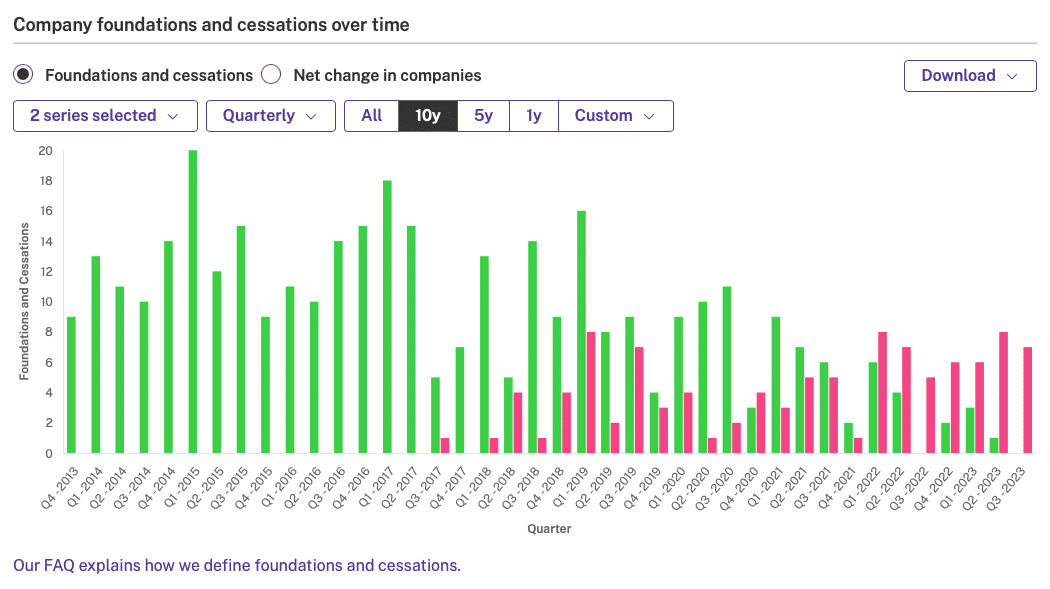
Alternatively, you can browse your local area by tracked companies.
We create detailed profiles of high-growth companies that meet our eight tracking triggers, which signal high growth or ambition. For example, they may have secured equity investment or have spunout of a university.
In Bristol, there are 819 tracked companies, operating mainly in AI and fintech:
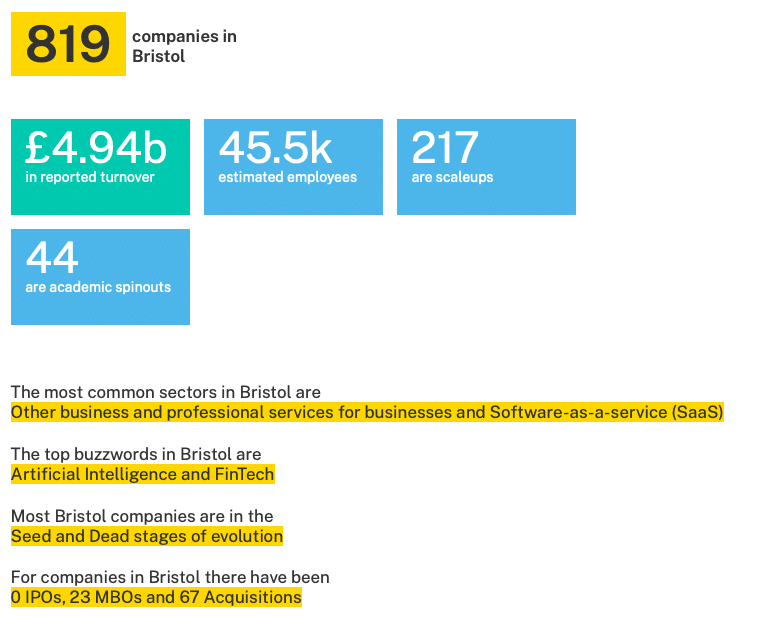
The tracked high-growth companies give you a quick view of some of the most exciting businesses in your area. And the broad picture can be broken down into much more specific information, categorising businesses by IPOs, the number of accelerators attended, or the number of acquisitions.
This way, you can see which companies are innovating in which sectors in your area, and which sectors may need more support.
For example, Coventry and Warwickshire Growth Hub uses Beauhurst to identify overall trends in the county. The Hub uses that information to provide business grants and bring in specialists to address specific recruitment needs. Jon Bass, Financial Specialist at the Growth Hub, can focus his search on businesses operating within a certain postcode.
According to Jon, “The granularity of data on the Beauhurst platform is quite astounding—whether it’s how many university spin outs are operating in our area, which companies have received Innovate UK grants, or a news article from six months ago about a company raising funds.” He says that without Beauhurst, he’d be looking for needles in haystacks, “Searching for weeks and creating spreadsheets like they’re going out of fashion.”
By using Beauhurst, Jon saves at least five hours per week.
3. See rich data about key people
Beauhurst doesn’t just provide you with data on businesses, but on influential people, too.
Compared to Companies House, Beauhurst offers a much fuller picture of your local business landscape and the people in it. Companies House may give you the names of company directors, but it won’t help much more than that.
Beauhurst offers a range of data points on company directors, owners, and anyone else who is influential in that company:
- Past and present job roles
- The shares they own
- Whether they’re in your network—by first-degree or second-degree relation
- Whether they’re a key person in a company or fund
- Their contact details
And just as you would with a company, you can search Beauhurst for many of these criteria.
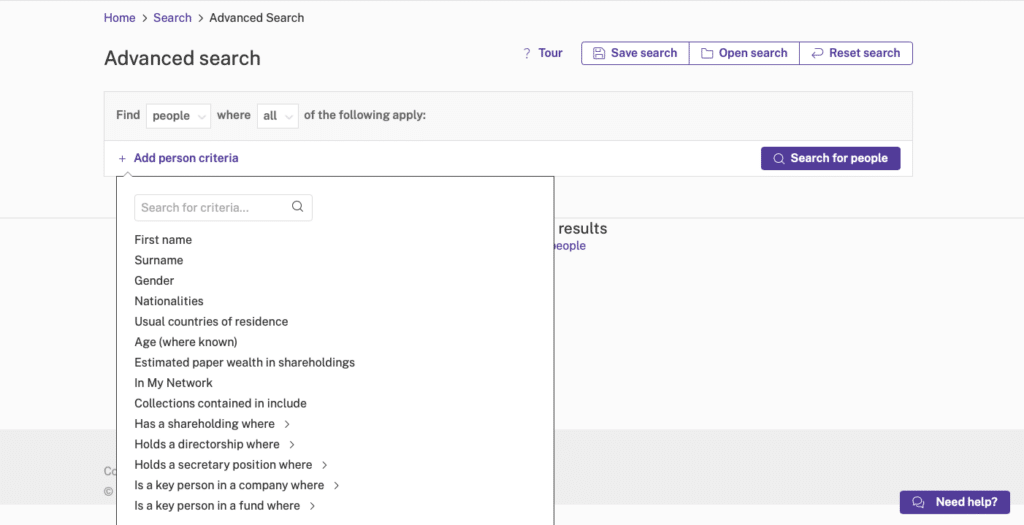
For example, you could search for directors of businesses working on AI in Birmingham and be shown a list of results including their age, the value of their shareholdings, and the current organisations they work at.
Then you can click through to their profile to see their LinkedIn page, contact details, and their links to different companies. (Note that Beauhurst is not just a tool to scrape email addresses for lead generation. If that’s all you want, this is not the right tool for you.)

For universities or councils looking for people with specific expertise, it’s invaluable information that’s simply impossible to find through the likes of Companies House.
4. Save searches to automatically track prospects, trends, and opportunities.
Beauhurst also lets you save the results that interest you and make sure you never miss any new events in that company.
For instance, say you’re a university interested in research collaborations with medical technology companies in Scotland. As you’ve seen already, you can make that search by selecting a location (“Scotland”) and choosing a sector (“medical technology”).
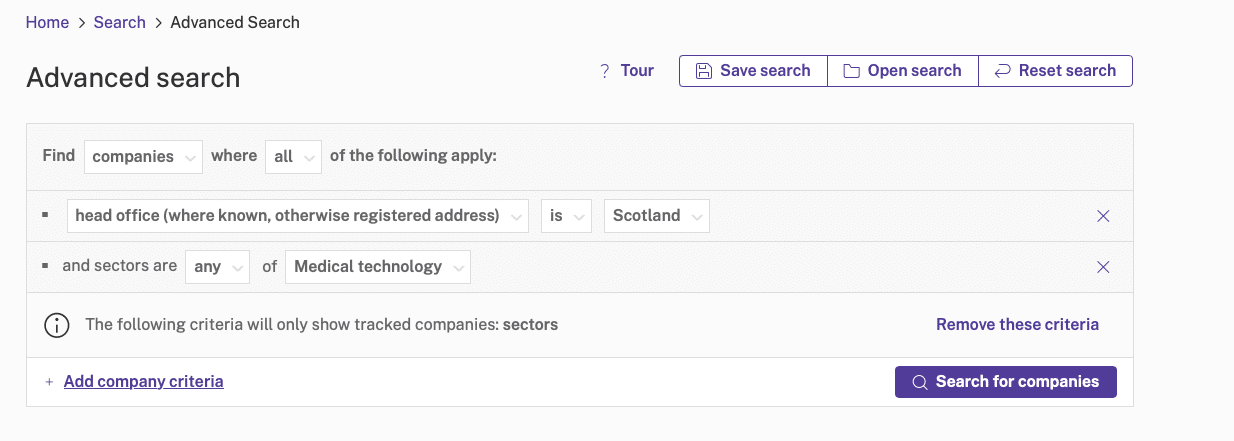
You can open up a page of any company and you’ll see information in a format that’s searchable, scannable, comparable, and commonsensical. Or you can save this search to “My Collections” for future reference.
Your Collections aren’t just a static record of your search. Rather, they’ll be continually updated as new information becomes available. For example, if there are key company events—such as a successful fundraising round—you’ll be notified. Or, if a new business enters the market, you’ll be the first to know.
The same can be done for searches on locations or people. But whatever it is you’re looking for, you can be sure that you stay well informed.
Plus, you can also plug all this data into your own systems with the Beauhurst API. This way, you’ll have all the data you need—complete, clean, and up to date—at your fingertips to use in whatever way you want.
It’s a powerful way to track the live performance of different companies. For example, the Science and Technology Facilities Council (STFC) uses Beauhurst to identify high-potential companies looking to raise finance. As Sue O’Hare, Operations Manager at the STFC has said, they couldn’t do it without Beauhurst:
“I have our 70+ alumni companies organised in a Collection, and can easily see a live chart of all the fundraisings they’ve secured in their lifetime. I have this permanently open on my second screen, so that I can quickly check whether any of the companies have completed a deal or have hit the news. I use these events as a trigger to reach out to them and get an update—and I report on them every month both internally and to our funders.”
“Beauhurst data helped us prove our impact and win support from stakeholders.”
Next, we’ll introduce three more alternatives to Companies House, starting with the Office for National Statistics (ONS).
2. Office for National Statistics
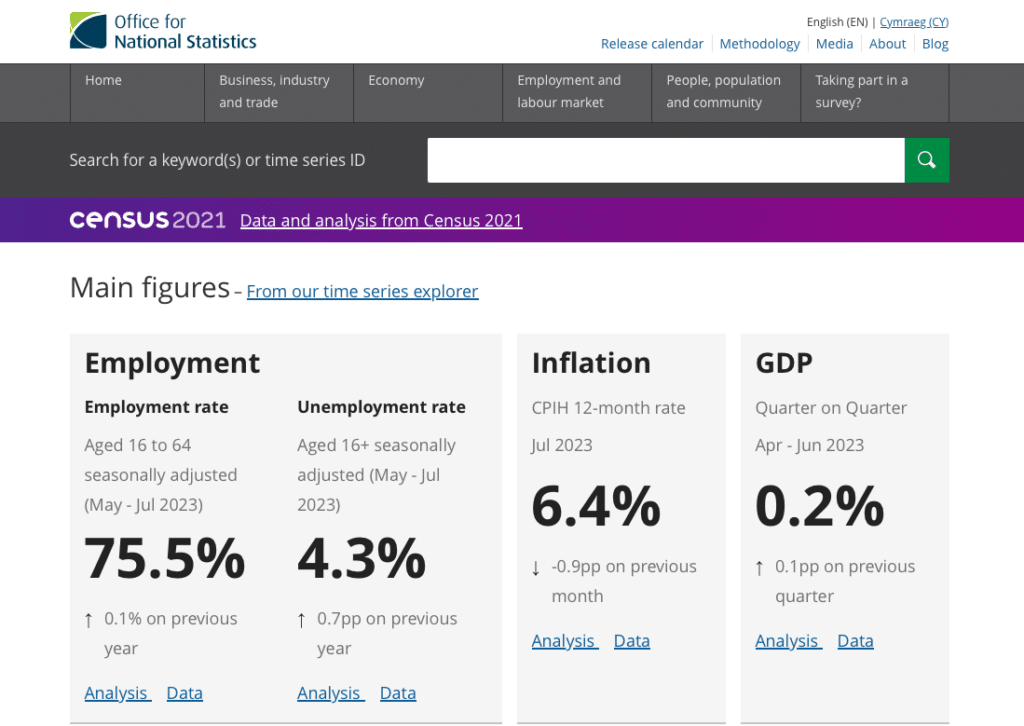
Another useful alternative to Companies House to find UK business data is the Office for National Statistics (ONS).
Like Companies House, the ONS is a governmental body. But where Companies House focuses on specific company data—as it is a register of individual businesses—the ONS provides a wider range of data, on everything from health to population to business trends.
That information is sourced from censuses and from the ONS’s own surveys.
In this way, it won’t provide an alternative source of the same data. Rather, it’s much better used as a valuable supplement to the data supplied by Companies House. Generally, universities, government agencies, and local authorities use it to understand the bigger picture of what’s happening in a particular region.
For example, you can use the ONS to see aggregated stats on:
- UK businesses by region, including data on size, financials, activity, and research and development
- Changes to business growth in specific industries (for example, in manufacturing or retail)
- Employment figures and economic output by region
However, as you’ll discover, the ONS doesn’t have a database that you can search by business, industry, region, or a similar criteria. Rather, it periodically publishes data releases, bulletins, and reports. To find the information you need, you’ll need to download the right spreadsheet and sift through the data yourself.
This means that it’s not nearly as easy to use as Beauhurst—particularly if you use it alongside Companies House. One benefit, however, is that all of this information is completely free to access because it’s in the public domain.
3. OpenCorporates
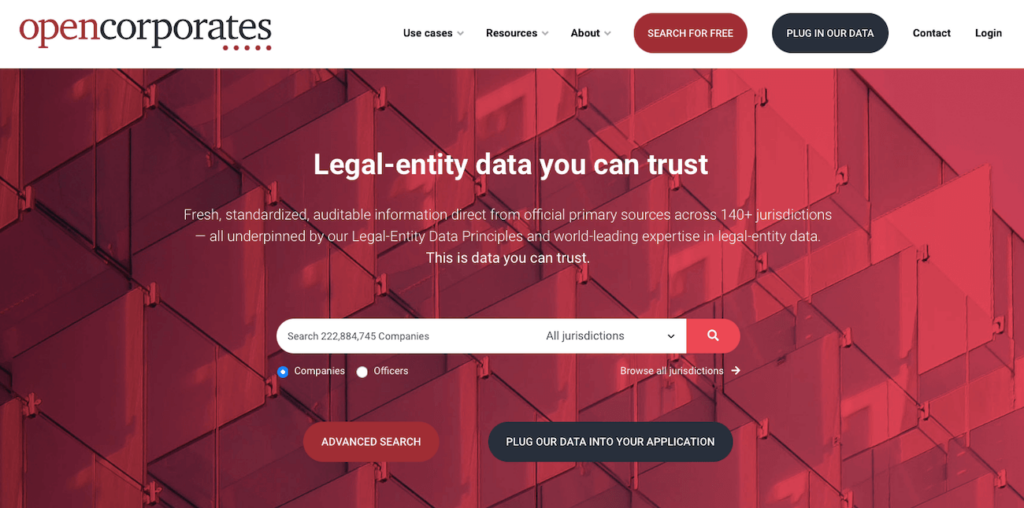
OpenCorporates calls itself the largest open database of corporates in the world. It features over 200 million companies in 140 geographies. That makes it a great alternative to Companies House if you’re looking for data on companies globally.
The platform actually sources its UK information from Companies House, as well as from similar government business registries in other nations. That means that while it offers an incredible breadth of data, it does have some of the same limitations as Companies House.
For example, like Companies House, OpenCorporates is really a database of legal entities—not actual companies. So, some companies may not be included in your local region if their registered addresses are elsewhere. Plus, its data will have the same inaccuracies as that of Companies House.
What OpenCorporates does though is standardise all this information, which gives it a distinct advantage over Companies House. Data on all 200 million companies is presented in the same way, allowing you to easily navigate it and compare. And users can update entries on particular companies if any information is lacking.
The specific aspect of OpenCorporates that distinguishes it from other organisations on this list is that it’s driven fundamentally by a social purpose. The goal of OpenCorporates is to boost corporate transparency, and as such it’s completely free.
That’s why journalists, universities, civil society, and anti-corruption investigators use it in their investigations and campaigns. For instance, it was used in the Pandora Papers investigation by the International Consortium of Investigative Journalists (ICIJ).
4. Company Check

Finally, Company Check is a business database that focuses primarily on financial information on businesses. In fact, it claims to be the UK’s most-used provider of business data, with over 100 million searches each year.
Company Check takes its company data from the likes of Companies House, local news sources, and the Registry Trust, a database of credit information. It stands out on this list for its focus, which is on businesses’ key financials, such as net worth, total liabilities, cash in bank, or credit ratings.
This makes it potentially useful if you simply need a reliable tool for due diligence, if you’re a business looking to generate leads for instance. However, Company Check’s data is not supplemented any further, meaning it won’t provide information on local trends, key individuals, or company event history. For that, you’d need a database that uses more sources to enrich its data, such as Beauhurst.
With Company Check, accessing basic information on businesses—such as director records and company registration details—is free. But you’ll need to pay for its most valuable offering; the database where you can access company reports, including information about directors and ownership structures.
Choose Beauhurst for the richest UK business data available
Here we’ve covered four alternatives to Companies House. Different options will be right for different people.
If you’re looking for broad statistics on the UK’s business environment, demographics, or health, the Office for National Statistics can be a helpful resource. OpenCorporates is good for journalists and civil society organisations interested in data on businesses globally. And Company Check is an option if you need basic information on businesses’ credit history.
Of all these options, Beauhurst has the most comprehensive database of UK businesses available. If you’re a university, local authority, private company, or investor looking for rich and up-to-date information on business activity, Beauhurst is the only place where you’ll find it.
With Beauhurst, you can:
- Find ideal research partnerships or investment opportunities with a powerful search of all UK businesses
- Track trends and key individuals in your local area to identify growth patterns and opportunities
- Plug clean, searchable, accurate, and up-to-date data into your internal system with Beauhurst API
Book a demo to speak to an expert and find out how Beauhurst can work for you.
Grow your business.
Get access to unrivalled data on all the companies you need to know about, so you can approach the right leads, at the right time.
Book a demo today to see all of the key features of our platforms, as well as the depth and breadth of data available.
An associate will work with you to build a sophisticated search, returning a dynamic list of organisations that match your ideal customer profile.
Beauhurst Privacy Policy